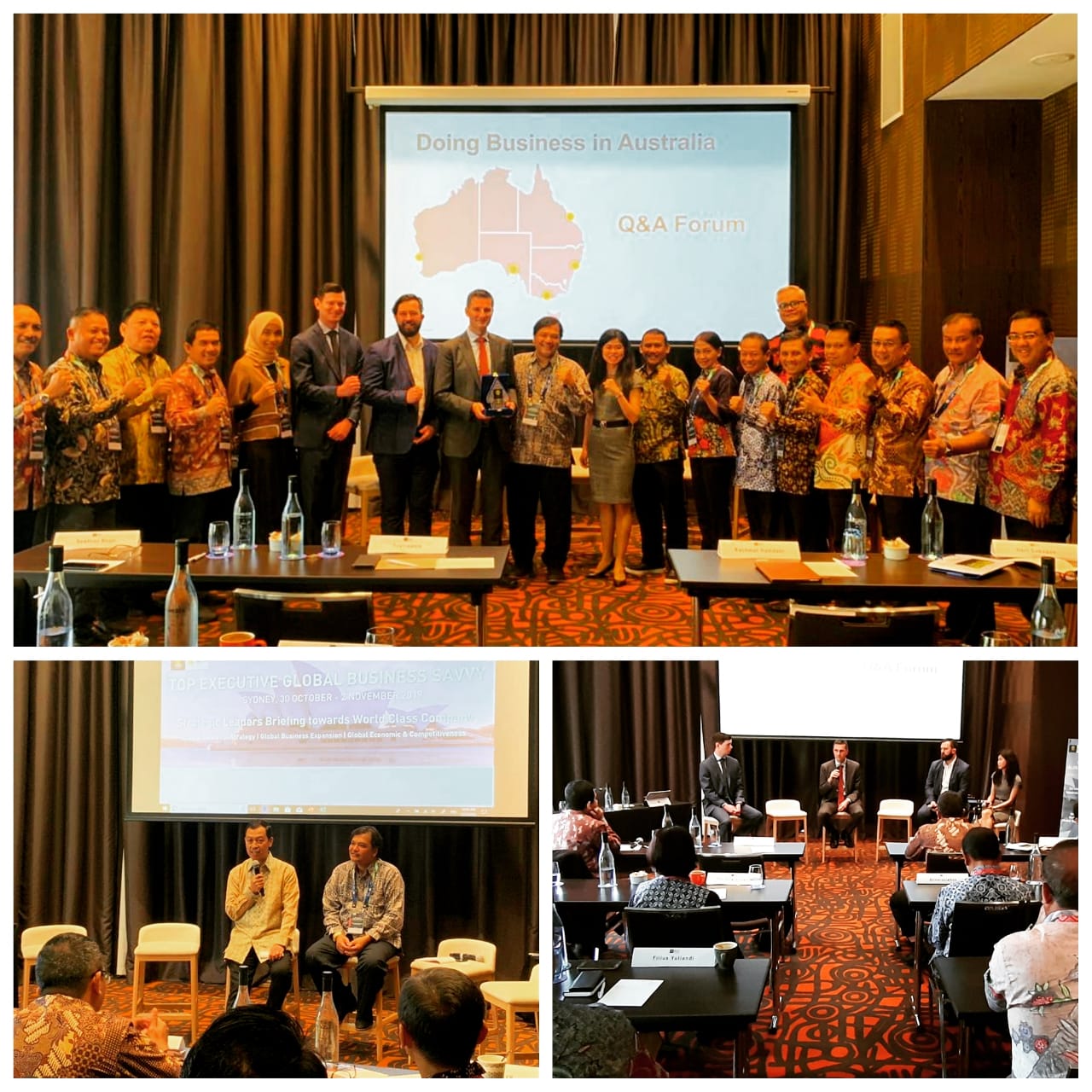FEB UI Management Institute: BUMN Needs to Anticipate Australian Market Potential
Nino Eka Putra ~ FEB UI PR
DEPOK – One of the important factors in improving the quality of talent in SOEs is the strengthening of international business aspects. Understanding of global business savvy, managing diversity and the ability to understand the characteristics of export destination markets are important elements. Therefore we need activities such as Executive Education combined with the Business Network Forum to improve negotiation quality and understanding global markets.
In this regard, the FEB UI Management Institute together with Crowe Global has organized the 5th batch of Global Savvy Training Program held in Sydney, Australia, on (28 October – 1 November 2019).
At the event, participants were given material on Strategy of Global Expansion, Australian Economic and Business updates, How to do business in Australia, and held panel discussions with the Australia-Indonesia Business Council, the Indonesia Trade Promotion Center (ITPC) Sydney, the Sydney Indonesia Investment Center, as well as business people namely Livingstone Group.
An initial description of business in Australia was provided by the Indonesian Consul General in Sydney, Heru Hartanto. In his explanation, it was conveyed that Australia-Indonesia has quite good economic relations. This is evident from Australia’s interest in investing in Indonesia which has reached a total of around 2.1 billion dollars in 2018 as well as trade transactions between the two countries. In addition, the Australian market is still open to Indonesian products despite the strict import regulations.
The ITPC said that although Indonesia-Australia economic transactions have always been deficit in Indonesia, the trend has declined. Economic transactions to the two countries in 2018 are worth 6 billion dollars, of which the deficit on the part of Indonesia is worth around A $ 3 billion. Indonesia’s main exports are manufactured goods, machinery and wood and plastic products.
While Australian exports are dominated by agricultural products such as wheat, beef, milk and other agricultural products. Australian investment in Indonesia is concentrated in the mining and metals sector, where Central Kalimantan and East Kalimantan are the main investment locations. On the Australian side, Indonesia as a trading partner ranks 14. Indonesia has to compete with Thailand, Malaysia, Singapore and Vietnam which are above it.
An explanation of current Australian market regulations and conditions is provided by Matthew Morgan, senior consultant at Crowe Australasia. He explained that in general Australia’s economic conditions were quite good and offered many possibilities for investors to come including business cooperation with the Australians.
Economic indicators show a positive number where the growth rate of 2% -4% in the last 10 years, inflation of around 3% and GDP per capita reached A $ 56,000 per year with a population of around 25 million inhabitants. He stressed that the implementation of the Indonesia-Australia Comprehensive Economic Partnership Agreement (IA-CEPA) would soon be very encouraging business between the two countries to grow rapidly.
According to Matthew, one of the business sectors that will develop rapidly in Australia is the renewable energy business, the mining and oil and gas sector, and property. The main areas of FDI destination in Australia are in the states of Victoria, Queensland and New South Wales. Foreign investment in Australia, for example by SOEs categorized as ‘foreign government investment’ must obtain approval from the Foreign Investment Review Board (FIRB).
Indonesian businessman who was quite successful in Australia was Ivan Paulus. The Livingstone business group under its control has had several companies with 5 branches and 9 warehouses throughout Australia in 2018. The business sector includes environmentally friendly health care products and hospital managers.
According to Ivan the key to successful business management is the ability to identify market needs and excellent product quality according to established standards, as well as quick responses to consumer needs. With more than 20 years of business experience Ivan plans to be able to start marketing Indonesian products to the Australian market and is very open to working with SOEs who will explore the Australian market.
In a business forum several things were discussed regarding the potential export-import of Indonesian products. Biofarma, for example, plans to immediately enter the Australian market, although it is currently still struggling with the issue of licensing which is not yet complete. The CCP has exported fertilizer to Australia and tried to be able to do it directly to reduce the role of traders.
On the other hand Petrochemical plans to secure a supply of raw materials in the form of phosphates by starting to explore in the Northern Territory. Explanation from Joseph Rustam, Chair of the Indonesia Business Council in Sydney was very helpful in providing input related to experience

